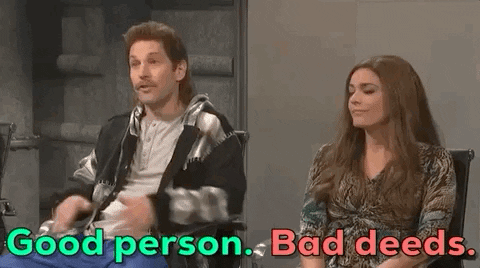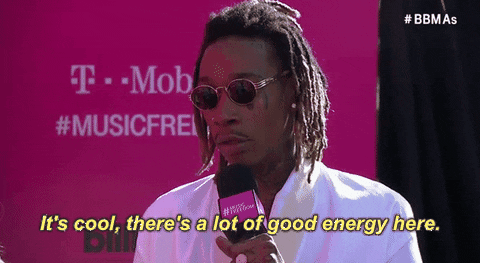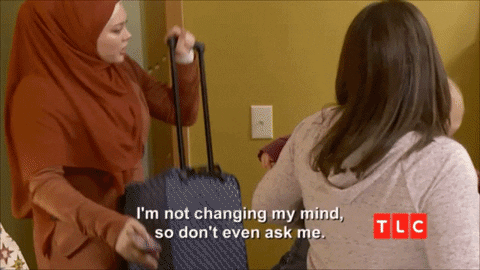
The spirit is a complex and, as you're about to see in just a moment, super layered kind of thing. From a biblical standpoint, if you looked up the Hebrew origin of the word (because the Bible was translated from Hebrew to English), it is "ruach" which is a feminine form of the word "breath". Breath isn't just the air that we breathe; breath is also our very life. Spirit is life.
And so, of course, it is imperative that we do all that we can to protect—to defend or guard from attack, invasion, loss, annoyance, insult, etc.; cover or shield from injury or danger—our spirit. Because, as a Native American writer and musician by the name of John Trudell once said, "Protect your spirit because you are in a place where spirits get eaten." Another way to look at this is, you are on a planet where spirits are oftentimes consumed. Devoured even. Yeah, that might not be a warm 'n fuzzy kind of intro, but that doesn't make the facts any less true. And just why are so many people having their spirits—their quality of life—devoured? I'd venture to say that it's because a lot of individuals don't even recognize just how vast their spirit actually is.
Let's do something to change that today. Below are seven words that are literal synonyms for the word "spirit". From personal experience, I can vouch for the fact that, if you take the necessary steps to protect each of these, the quality of your life, overall, will only get exponentially better. That's a promise.
1. Your Character

Some people like to define character as being one's personality. Personally, I think it goes a bit deeper than that. To me, your character is comprised of your behavior and the adjectives that could be used to describe it. For instance, someone might say that you're patient (or impatient), funny (or serious), dependable (or flaky). The reality is all of us have character traits that are good—and not so good. But hopefully, with the passing of every birthday, you come to a place of wanting to strengthen the good and weaken the bad.
Like with me, one thing that I know is a character trait of mine is I'm a big giver; so much so that I used to be codependent and also mad resentful when I would realize that some relationships were constantly taking me for granted. When I finally got to the point and place of accepting that it really is true that you teach people how to treat you, I started to set boundaries. I started to express what I expected out of my relationships and I learned how to only say "yes" if I knew I wasn't going to regret not saying "no" later. I also learned how to find the balance in doing things out of the goodness of my heart vs. doing things in hopes that someone would care about me as much as I cared about them. Mastering this has helped to keep me from becoming jaded and bitter; it has helped me to protect my giving spirit.
If you don't make a point to protect your good character traits, you can best believe that your bad ones will start to take over—maybe even overpower the good. That's why it's so important to take the time out to ponder what your good traits are and what you can (and should) do in order to make sure that those particular traits remain intact.
2. Your Energy

In the simplest form, energy is power. There is someone I know who says that he responds or reacts to other people based on the energy that they give him. Honestly, a lot of folks would probably say the same thing. However, the challenge with that is, if you take energy at its core definition, that means someone has the power to shift your power…and that's giving them a lot of power in your life (too much if you ask me!). In an article that I read entitled, "The People Factor: It's All About Energy", the author stated, "Understanding how people affect you means that you can do a better job matching what you need at any given moment to what your energy requires." I totally agree with that.
Something that I used to have in my space, a lot, both personally and professionally, were narcissistic individuals (check out "What If It's Your Parents Who Happen To Be The Narcissists?" and "3 Warning Signs You're In Love With A Narcissist"). Because I didn't know the traits—and agenda—of narcissists at the time, I didn't get why a lot of relationships had me emotionally drained and sometimes very depressed. But baby, after a year of studying narcissistic abuse, I get it. I realize that a part of what a narcissist does is look for people's power sources to take as their own. And so now, the people who I know are narcissists, I keep a safe distance from. Also, when I recognize that someone is showing red flags of being one, I mentally and emotionally remove myself. I don't try and "compete" with narcissistic energy or even try and change the individual (most of them can't without therapy anyway). I simply make sure to not give them my power (including my time, resources or emotional investment).
A wise person once said, "Certain people and their toxic energy can block you from expanding, elevating and vibrating higher. Detach and protect your energy." One definition of power is the "ability to do or act; capability of doing or accomplishing something". Anything or anyone who is constantly a stumbling block or hinderance for you in this area, they are someone who is working against, not for you. Protect your energy and release them (check out "Why I Don't 'Cut People Off' Anymore, I Release Them Instead" to see what I mean by that)—whether that be for a time or forever.
(By the way, if you want to learn a bit more about the kind of energy that you have, overall, take the personality test, "What Kind of Live Energy Do You Have?". I took it and it was pretty spot-on.)
3. Your Humor

Anytime I'm talking to someone and they say, "You're hilarious", I find that to be one of the best compliments ever. Not only does it remind me that I am able to see the joy in life in spite of a lot of what I have been through, but I know that a good sense of humor is beneficial to our mental, emotional and physical well-being. You can read articles like "Stress relief from laughter? It's no joke", "A good sense of humor is a sign of psychological health" and "A sense of humor could mean you're a healthier, happier, and smarter person" to confirm this fact. Meanwhile, there is a particular person in my family who is basically the humor police. It's not so much that they lack a sense of humor as they want to "regulate" what everyone else should think is fun or funny. Ugh. Not only is that controlling as all get out (I am not you and you are not me; chill out), but it's also a slick way of trying to keep others from protecting a part of their spirit.
Yep, believe it or not, humor is another part of your spiritual being. Make sure that you laugh often. Make sure you surround yourself around others who do the same. And, if there are people who are constantly bringing your joy down, can't take a joke or need to freakin' lighten up—realign your boundaries and how much time you spend in their presence. In times like these, humor is not a luxury; it is an absolute necessity.
4. Your Attitude

When I'm tired (the weary kind). Two days before my period. Right after a long writing day. For about 12 hours after processing a disappointment. Those are the times when my attitude can be a bit stank. I'm self-aware enough to know that. What I used to selfishly do is subject people to whatever mood, words and actions came with my foulness. Now I know that I'm not protecting others when I do that and so I retreat in solitude until I can get myself together.
For the most part, your attitude is all about how you choose to express yourself at any given moment. And since there is plenty of data out here to support the fact that negativity can be quite contagious, it's important that you protect your "self-expression" by 1) knowing who and what triggers you; 2) discovering tactics that others use in order to do it (check out "Gaslighting, Love Bombing & 5 Other Triggers To Call Out In Your Relationships"); 3) taking care of your physical health (check out "In A Bad Mood? These Foods Will Lift Your Spirits!") and 4) disciplining yourself so that your emotions don't control you, you control them.
A lot of us have missed out on all kinds of good things due to our bad attitude; that's the bad news. The good news is we each have the power to protect ourselves so that our attitude can remain positive and productive. Always make sure to keep that in mind.
5. Your Enthusiasm

These days, when someone asks me what should be a deal-breaker in a relationship, one of the things that I say with, pardon the pun, off-the-charts enthusiasm is, well, enthusiasm. I can't tell you how many married couples I deal with who are on the verge of ending things and a big part of it is because they feel like their spouse lacks enthusiasm ("intense and eager enjoyment, interest, or approval"). It could be a lack of enthusiasm when it comes to their goals and dreams. It could be lack of enthusiasm in the bedroom. It could be a lack of enthusiasm in them, period.
While on the surface, enthusiasm may not seem like all that big of a deal, the reality is, it's hard to start or finish things in excellence if enthusiasm is lacking. That's why you need folks who are supportive, who totally have your back and who are consistently cheering you along the way.
Ladies, I hate to say it, but oftentimes the lack of enthusiasm in a marriage tends to come from our side (at least with marriages I deal with). Again, enthusiasm makes up our spirit man (and woman), so it's natural for us to want to build up walls against people who lack enjoyment, interest and approval of us. If you are an enthusiasm-drainer, there's no time like the present to change that. If you're wasting precious time trying to get others to be enthusiastic about you and what you've got going on…that's definitely something to think long and hard about because it is definitely doing a number on your spirit. Not in a good way either, sis.
6. Your Heart

This one is interesting because, oftentimes, when people (especially women), think of their heart, they think of it in the context of love and relationships. Since that is the case, I will say that one way to protect your heart is to actually learn from your past experiences. When it comes to brokenness, people, especially women, are actually pretty resilient. It's not usually one person who takes us out but a pattern that we've been repeating and/or ignoring. If that sentence just "pricked" you on some level, make sure that you take heed to what you're allowing to be done over and over that is harming you—mind, body and/or soul.
However, by definition, your heart is the center of your emotions. And while, I'm personally not big on letting our emotions rule our decisions (shoot, even the Bible warns us to not follow our heart because it has the tendency to be deceitful—Jeremiah 17:9-10), I do like how one article stated that our emotions are how we communicate to other people. So, you know what that means, right? Since a good communicator listens well; practices empathy with others; seeks clarity; is aware of their body language; is knowledgeable in what they speak on and about; can be the teacher as well as the student when necessary; is tone-conscious; tries to avoid misunderstandings as much as possible; pays attention to patterns; can receive constructive criticism and, is open to receiving new ideas—you have to protect your heart by surrounding yourself with people who strive to communicate well with you as you seek to do the same thing with them.
A lot of personal and professional relationships are destroyed due to poor communication. At the end of the day, it's because people don't recognize how much bad communication damages the spirit.
7. Your Resolve

OK, let me start this one off by saying, it's one thing to be resolved; it's another thing to be stubborn. Don't confuse the two. It's an epidemic, how many people are so prideful and egotistical that they can't be advised on anything. That is definitely not what I'm referring to here. No, what I mean by resolve is "to come to a definite or earnest decision about" your core values, needs and how you want to live out your life's purpose. If you are single and desire a life partner, before you can find someone who truly complements you, you've got to be resolved in who you are as a person.
And, when it comes to resolve overall, it's easier to figure out what you want your personal and professional life to look like once you are resolved in what you desire out of this life. Yeah, it makes total sense why resolve is a synonym for spirit. Our decisions determine the quality of our life.
A lot of information is provided on how to care for one's body. But what does that matter if our spirit is damaged? It's not only relevant to protect your spirit, it is essential. So much of who you are is within your spirit. Protect it—without reservation or apology. Those who honor your spirit will only support—and respect—you for doing so. Make sure you do the same for them. Again, spirit is life.
Want more stories like this? Sign up for our newsletter here and check out the related reads below:
I've Got Some Ways For You To Start Pampering Your Soul
Here's How To Stop Worrying So Freakin' Much
What Loving Yourself Actually Looks Like
What's The Difference Between Being 'Religious' And Being 'Spiritual', Anyway?
Feature image by Shutterstock
- Jhené Aiko's Vibrational Healing Will Get Your Chakras All The Way ... ›
- How My Trip To New Orleans Awakened A New Spiritual Path ... ›
- How To Get Out Of A Bad Mood Fast - xoNecole: Women's Interest, Love, Wellness, Beauty ›
- Spiritual Things New Orleans Trip To Do - xoNecole: Women's Interest, Love, Wellness, Beauty ›
- Protecting Your Spirit and Your Sanity : Yoli's Green Living ›
- How to Create Healthy Boundaries and Protect Your Energy ›
- Protecting Your Energy and Your Aura ›
- How to Create A Spiritual Protection for You and Your Home? - Eye ... ›
- Going Beyond Ministries with Priscilla Shirer - Protecting Your ... ›
- 9 Steps on How to Protect Yourself Spiritually - Forensic Healing ›
- Tips for Sensitive People to Protect Their Energy | Psychology Today ›
- 10 Ways to Strengthen and Protect Your Spiritual Magnetism ... ›
- Protecting Your Spiritual Energy ›
- 8 powerful ways to protect your spiritual energy - Earthmonk ›
This Is How To Keep 'Holiday Season Stress' From Infecting Your Relationship
Hmph. Maybe it’s just me, but it seems like there is something really weird happening in the fall season air (because winter doesn’t officially begin until December 21) that cuddle season is in full swing while break-up season is as well. In fact, did you know that break-ups are so popular during the holiday season that December 11 is deemed Break-Up Day?
The reasons why relationships shift around this time vary; however, I did both roll my eyes and chuckle when I read that a very popular one is because it’s an easy way to get out of getting one’s significant other a Christmas present. SMDH.
Anyway, I personally think that the less shallow folks out here may contemplate calling things “quits” or they at least distance themselves a bit from their partner (and what I’m referring to is serious relationships) due to all of the stress and strain that oftentimes comes with the holidays whether it be financial, familial, due to their tight schedules or something else.
Listen, I would hate for you and your man to miss the fun and happiness of experiencing this time of year, all because you are so overwhelmed or irritated that you can’t really enjoy it. That’s why I have a few practical tips for how to avoid allowing the typical holiday season stress from INFECTING your relationship.
Manage Your Expectations
 Giphy
GiphyUnmanaged expectations. If there is a main reason why the holiday season tends to be so stress-filled for so many people, I’d bet good money that this is the cause. And when you’re in a long-term relationship, expectations can manifest themselves in all sorts of cryptic and/or unexpected ways. You might have relatives who assume that you are going to be with them for Thanksgiving or Christmas when you have other plans in mind. You might be thinking that you are going to spend one amount for presents while your man is thinking something totally different. When it comes to scheduling, your signals may be crossed.
And you know what? To all of these scenarios, this is where clear and consistent communication come in. Don’t assume anything. Don’t dictate anything either. From now until New Year’s, mutually decide to check in once a week, just to make sure that you are both on the same page as it relates to the holidays and what you both are thinking will come along with it. The less blindsided you both feel, the less stressed out you will be. Trust me on this.
Set (and Keep) a Budget
 Giphy
GiphyOkay, so I read that last year, 36 percent of Americans incurred some type of holiday-related debt. Hmph. Last year, there was still some sense of normalcy in this country, chile, so I can only imagine what finances are gonna look like over the next several weeks. That said, since I don’t know a lot of people who don’t find being broke stressful, make sure that you and your bae set a budget and then stick to it this year — no ifs, ands or buts.
Because really, y’all — it doesn’t make sense to deplete savings and/or max out credit cards for a few days of giggles only to be damn near losing your mind because you don’t know how to make ends meet come Dr. Martin Luther King, Jr. Day.
And by the way, this tip doesn’t just speak to things like food and gifts; I also mean travel. If it doesn’t make a ton of sense (or cents) to be all over the place this year — DON’T BE.
Keep Matthew 5:37 at the Forefront
 Giphy
GiphyIf off the top of your head, you don’t know what Matthew 5:37 says, no worries, here ya go: “But let your ‘Yes’ be ‘Yes,’ and your ‘No,’ ‘No.’ For whatever is more than these is from the evil one.” That verse right there? Oh, it’s a boundaries lifesaver! I say that because do you see “maybe” or “I’ll think about it” in there? Nope. LOL. It says that you should tell people “yes” or “no” and leave it at that — and that complements Anne Lamott’s quote, “’No’ is a complete sentence” impeccably well. Yeah, you’ve got to remember that anything beyond a yes or no to a request is privileged information; you don’t owe anyone details or an explanation.
Besides, if you are really honest with yourself, when someone asks you something and you give a “Umm, let me think about it” kind of reply, more times than not, you already know what your answer is going to be — so why not let you both off of the hook? Give your response. Commit to that. And let everyone (including yourself) get on with their lives and schedules.
I promise you that when it comes to those holiday parties, you are pissing more folks off by not RSVP’ing or doing so and not showing up than just saying, “Thank you but not this year” off the rip.
Remember That Your Personal Space Is Privilege Not a Right
 Giphy
GiphyA friend of mine recently bought a new house and invited me over to come see it. He’s a single man with no children, so as I was taking in all of the space that he had, especially as I walked through his finished basement, I joked about relatives coming to live with him. “Hell no” and “absolutely not” were pretty much his immediate responses as he went on to say that some folks even had the nerve to be offended when he told them that he had no intentions on taking DNA in.
Ain’t it wild how people think that your stuff is their right? And yes, that brings me to my next point. Your home is your sanctuary space. If you want to host folks this year — cool. If not, ALSO COOL. Please don’t let folks (family included) guilt you into how they want you to act or even into what they would do if the shoe was on the other foot. You are not them — and as one of my favorite quotes states, “If two people were exactly alike, one of them would be unnecessary.” (A man by the name Larry Dixon said that.)
Hell, my friends? They know that I am good for sending them random things that they need or even want all throughout the year. Coming over to hang out at my pace, though. Uh-uh. Chalk it up to being a card-carrying member of the ambivert club yet I like keeping my living space personal — and I sleep like a baby, each and every night, for feeling that way.
Always remember that your space, your time, your resources, your energy and shoot, yourself period (including your relationship), are all things that are your own. You get to choose how, when and why you want to share them. The holiday season is certainly no exception.
Cultivate Some “You Two Only” Traditions
 Giphy
GiphyIt’s not uncommon for some couples to hit me up after the holiday season to “detox.” Sometimes it’s due to the financial drama (and sometimes trauma) that they experienced. Sometimes it’s because they allowed their relatives (especially in-laws) to get more into their personal business than they should’ve. More than anything, though, it tends to be because they didn’t get enough quality time together and so ended up feeling “disconnected.”
Please don’t let that happen. Listen, I’m not even a holidays kind of woman and yet, I will absolutely sit myself down with some hot chocolate and chocolate chip cookies to enjoy a Hallmark holiday film or two. Aside from the fact that most of them are lighthearted and sweet, I also like that they usually focus on couples loving on each other amidst all of the holiday beauty and ambiance — which is something that all couples should set aside some time to do.
Maybe it’s a vacation. Maybe it’s a staycation. Or maybe it’s my personal favorite, A SEXCATION. Whether it’s for a few days, the weekend or even overnight — don’t you let the holidays go by without setting aside time for you and your man to celebrate one another. Don’t you dare (check out “Are You Ready To Have Some Very Merry 'Christmas Sex'?”).
GET. SOME. REST.
 Giphy
GiphyI once read that 8 out of 10 people get stressed out over the holidays and 3 out of 10 lose sleep during to it — and when you’re stress-filled and sleep-deprived, that can absolutely lead to hypersensitivity, making mountains out of molehills and even not being in the mood for sex.
Your relationship can’t afford to go through any of this, so definitely make sure to prioritize rest. I don’t care how unrealistic it might seem during this time, sleep should never be seen as a luxury; it will always and forever be a great necessity.
That said, try to get no less than six hours of shut-eye in (check out “6 Fascinating Ways Sex And Sleep Definitely Go Hand In Hand”) and even ask your bae to take a nap with you sometimes (check out “Wanna Have Some Next-Level Sex? Take A Nap, Sis.”). Not only will sleep help to restore your mind, body and spirit but, when it’s with your partner, it’s an act of intimacy that can make you both feel super connected, even in the midst of what might feel like chaos.
___
Holiday season stress is real. Still, never give it the permission or power to throw your relationship off. Put you and your man first and let the holidays be what they are gonna be, chile.
Let’s make things inbox official! Sign up for the xoNecole newsletter for love, wellness, career, and exclusive content delivered straight to your inbox.
Featured image by Shutterstock
Dreaming Of A White Christmas? These 7 Winter Wonderland Destinations Are Perfect For The Holidays
While most people opt for a tropical vacation during the winter months, there are still many people who want to fulfill their winter wonderland fantasies, which are more than likely centered on watching snow by the fireplace while sipping some hot cocoa.
With Thanksgiving vastly approaching and Christmas a little under a month away, there is still time to ditch the traditional Christmas home to visit family or friends.
Whether you’re looking to put a new stamp on your passport and keep things domestic with a destination in the States, xoNecole has you covered with a few hotspots for those itching to go somewhere cold (but with cozy vibes) this holiday season.
Aspen, Colorado
Our Christmas queen, Mariah Carey, has been taking an annual trip to this snowy destination since 1997, just three years after dropping the track that would make her the unofficial (but official to us) ambassador of the winter holiday.
Aside from being a key vacation spot for one of the culture’s greatest musicians, Aspen also offers travelers access to world-class skiing and snowboarding and four distinct mountains that provide the perfect backdrop for a winter vacation.
Whistler, British Columbia, Canada
Home to the largest ski resort in North America, Whistler Blackcomb, this destination is located in the Coast Mountain Range and is about 75 miles north of Vancouver.
From luxury spas like Scandinave Spa Whistler to Olympic Park, this is another top winter vacation spot that offers a unique experience for people who love snow and the thrill of a good adventure.
Western Massachusetts
Dubbed the place for a magical holiday escape, Springfield, Massachusetts, blends the warmth of small-town charm with unforgettable experiences like Grinchmas at Springfield Museums, Winterlights at Naumkeag in Stockbridge, Historic Deerfield’s Winter Frolic, and many others.
This destination offers something for all ages, and it’s close to home, making it all the more reason to place on your radar for a winter getaway.
Rovaniemi, Finland
If you want to really get into the Christmas spirit, this just may be the place for you. As the official home to Saint Nick himself, Rovaniemi, Finland offers reindeer sleigh rides, the opportunity to stay in a glass igloo, as well as an opportunity to experience the Santa Claus Village.
Lake Tahoe, California/Nevada
Who says that visits to the lake house are only reserved for summer vacation? A winter trip to Lake Tahoe is equipped with stunning lake views and top-notch ski resorts, including Heavenly and Northstar.
Chamonix, France
Sitting at the base of Mont Blanc, Chamonix, France, is known for its skiing and mountaineering. This destination is home to the Aiguille du Midi cable car, the charming Alpine village, and is also close to various other European ski destinations.
Northeastern Pennsylvania
This area of the U.S. state is home to the Poconos Mountains, whose renowned ski resorts include Camelback Mountain, Blue Mountain, and Jack Frost Big Boulder. Whether you’re a ski expert, a beginner, or just there for the vibes, this destination makes for a winter vacation that balances fun adventures and cozy getaways. Additionally, Pennsylvania is home to the Christmas Tree Capital of the world.
Feature image by Shutterstock
Originally published on November 23, 2024









